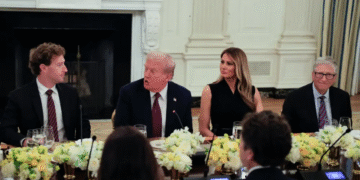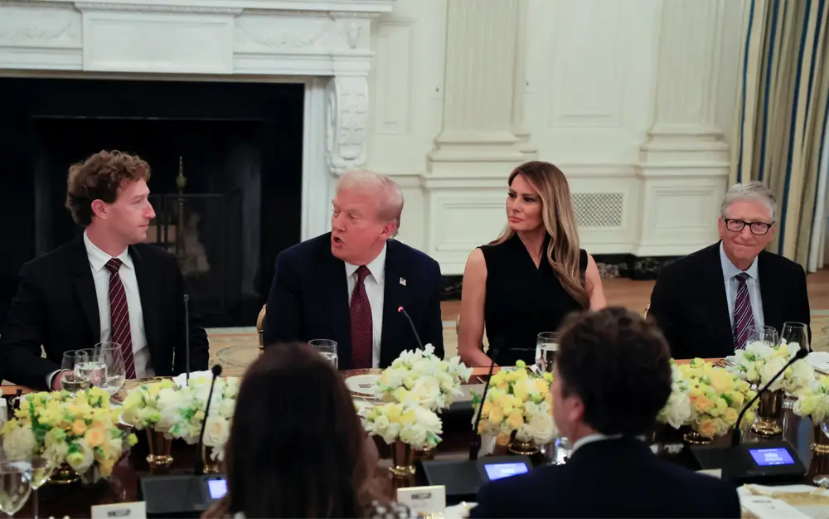A Dinner That Blended Politics and Power
On the evening of September 4, the White House played host to a rare gathering of Silicon Valley’s most powerful leaders. President Donald Trump welcomed the CEOs of Apple, Google, Meta, Microsoft, and OpenAI for a formal dinner that was equal parts celebration, strategy session, and political theater.
The central theme of the evening was unmistakable: America’s role as the global leader in technology and innovation. Trump pressed his guests directly, asking each one to declare their investment commitments in the United States. The answers came with staggering numbers—and with them, the promise of a trillion-dollar boost to America’s economy.
Billion-Dollar Pledges on the Table
When asked how much they were investing in the U.S., the executives delivered bold figures:
- Mark Zuckerberg (Meta): $600 billion by 2028.
- Tim Cook (Apple): Matching the same $600 billion over the next three years.
- Sundar Pichai (Google): $250 billion in infrastructure and AI projects.
- Satya Nadella (Microsoft): Up to $80 billion annually, reinforcing Microsoft’s dominant U.S. footprint.
- Sam Altman (OpenAI): Expanding AI infrastructure and research with a U.S.-first approach.
Each announcement was met with nods of approval from Trump, who punctuated the moment with short remarks—“Good,” and “Very good”—underscoring his satisfaction with their loyalty to American soil.
Trump’s Moment of Praise for Apple
One of the evening’s lighter moments came when President Trump turned to Apple CEO Tim Cook. According to viral video clips and several media reports, Trump praised him by saying: “Tim Cook, you’ve done an incredible job with the little company called Apple.”
Cook, smiling, responded simply: “Thank you, Mr. President.”
However, official transcripts of the event do not include that exact phrase, suggesting it may have been a casual aside not formally recorded. Whether playful or intentional, the remark quickly spread online, adding a touch of humor to an otherwise high-stakes dinner.
Politics Meets Business
The dinner underscored the growing convergence between government and big tech. For Trump, the pledges were a powerful symbol of his “America First” economic vision. He could point to hard numbers—trillions in planned investment—as evidence of confidence in U.S. growth.
For the CEOs, the event offered both visibility and leverage. Their promises reinforced loyalty to the domestic economy while also positioning their companies closer to policymakers. In an age where regulation and innovation collide, being seen as cooperative carries immense strategic value.
Symbolism in the Setting
Holding the dinner in the White House elevated the symbolism. It suggested unity between America’s political leadership and its tech industry, and sent a signal to international rivals that the U.S. intends to remain at the forefront of innovation. Every toast, handshake, and pledge played into a narrative of national strength and technological supremacy.
The Empty Chair: Elon Musk
Notably absent from the event was Elon Musk. His no-show was widely noticed, especially given his influence across multiple industries, from electric vehicles to space exploration. Musk’s absence highlighted the sometimes complex relationship between Trump and Silicon Valley’s most unpredictable figure. In a room full of power, one empty seat was a story in itself.
The Larger Message
Beyond the spectacle, the dinner carried a clear message: the future of American innovation depends on the collaboration between government and industry. The CEOs’ pledges promised jobs, infrastructure, and growth—but they also revealed how closely corporate interests are tied to political dynamics.
These commitments will be judged not by applause in a White House dining hall, but by their real-world impact over the coming years.
Looking Ahead
As the guests departed, the promises left behind carried both hope and uncertainty. Trump secured the optics of loyalty and economic strength. The tech leaders gained proximity to power. And America was left with the prospect of a trillion-dollar wave of investment that could redefine its role in the global tech race.
In the end, the White House dinner was not just about food. It was a declaration—that America’s technological future will be shaped at the intersection of politics and Silicon Valley, where influence and investment go hand in hand.
















